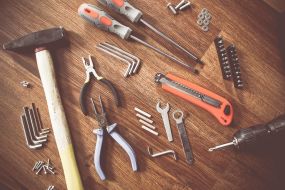
One common issue that is easy to trivialize is the effect of dust and dirt build-up. This is a source of efficiency loss over time. Dirty or clogged heat exchangers will prevent heat from flowing down the ductwork and through the vents. The thermostat will respond by increasing heat output to achieve the desired air temperature. Because debris often compounds to increase the size of blockages over time, not keeping heat exchangers and air conditioning coils clean can result in a 10% loss in energy efficiency per year. Commercial HVAC companies that reach out to you on an annual maintenance schedule are good, because it is easy for building managers to lose track of what was done last, and when.
Monitoring the flow
Another problem is excessive resistance to airflow from dirty filters and clogged diffusers. All filters will impose some resistance to airflow so that they can capture airborne particulate. The problems start when the filters are not cleaned regularly and replaced at the end of their working life. It is not uncommon for contaminates found in dirty filters and diffusers to get dispersed into the air again. This is not good. It can trigger asthma flare-ups and allergic reactions (especially if there is dust mites and mold spores) which can cause absences from work due to illness. Commercial HVAC companies who take filter integrity seriously are ideal. It is also important to have them scrub the ductwork itself, so that there are no pathogens stemming from rust or hardened deposits that will go into the air.
Another notorious HVAC culprit are dirty blowers. Usually this is seen in either the fan base or the motor belts. When dust and dirt collect near the base of the fan, this will prevent the blades from turning as quickly as they are supposed to. Reduced fan speed is another source of inefficiency because it means that regions far away from the main furnace or air conditioner that are serviced by the blowers will not get as much cold or warm air delivery. This will set the stage for temperature discrepancies in different areas of the building.
This puts especially high strain on your system in the summer when air conditioner loads are high. Because the fans can sometimes overheat when they are forced to run in such a state, the residual heat will counteract the cooling effect of the air conditioning. If enough of the fans become compromised, all of the resulting heat may affect the indoor air temperature. Once this happens, there is often a feedback loop effect – the system will work harder to counteract the heat, which in turn will generate more heat from the overworked motors, and so on. Dealing with commercial HVAC companies who have enough experience to know when a fan might be clogged is pivotal in the long-run.
Brought to a standstill
The worst case scenario that managers want to avoid is having to stop onsite activity outright due to HVAC failure. This is the thing that all commercial HVAC companies are in business to prevent. Failure can result from a few things. If there is an intolerably high resistance to airflow from blockages, and this is not dealt with, the furnace can become overloaded and quit working, leaving the building without heat. When the building goes without heat, the space must be vacated until the furnace is repaired or even replaced. Locating the right model with the right outputs can take time.
Another issue is problems with the belts that move inside the blower motors. If they get dirty or become compromised in some way and cannot move smoothly, the motor will fail. Without blowers functioning to disperse hot and cold air, the HVAC system must be shutdown, and remain so until the motors are replaced. Blower motors tend to be expensive. Also, they are not a common part that is replaced frequently, which means they are often not kept in stock. They can take months to arrive. Using commercial HVAC companies that are good at servicing blower motors is what separates a good manager from and average one. Blower motors have the most moving parts and are therefore the most vulnerable to wear and tear. Many amateurs will not take the time to inspect them or run the necessary tests on them to see how they are doing. Anybody can scrub ducts or replace filters but finding someone capable of looking after the motors is what you really want. These kind of inspections are worth the money.




